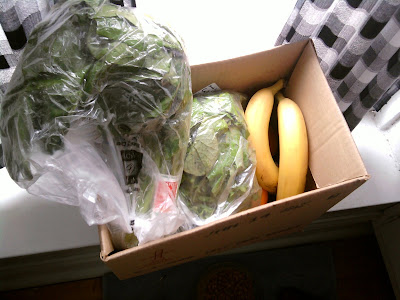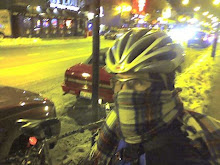On Saturday, Patty and I dropped in for a look at the New Leaf Natural Grocery in Rogers Park. A much smaller space than I was expecting, it was an eclectic shop, with kind of a General Store vibe to it. Lots of rustic wood and brick, and I almost expected to see a couple of prospectors standing in the back, the sounds of rusty metal and dry leather as they restlessly shifted on their feet, waiting to purchase supplies before heading back out to their claims.

There was a cooler with several greens in it, including spinach, kale, and zucchini. Next to it was a selection of bulk grains, including granola, beans, and wild rice. Across the store there was more shelf-stable produce, like potatoes and onions. Down from that was another open cooler with apples, pears, and other fruit. Fair trade coffee was brewing, being enjoyed by a young group of four sitting in a booth by the window over some other food I assume they purchased there.
Mostly, however, there were a lot of packaged goods, brands which you'd see at Whole Foods or Trader Joe's, and almost nothing seemed local, at all. Patty's CSA box contained spinach, radishes, kiwi fruit, oranges, green apples, and two bananas. All in all, a fair amount of organic items for $15, but the closest any of it came from was California, and the kiwi was in fact Italian.

Yesterday I felt like taking it quite easy and relaxed. Patty had given me a copy of a magazine called Good, and it was their "Slow" issue. In it was a great recipe - I have no idea why they call it pancakes - but it was delicious regardless (I had bananas instead of plums).

I wanted a "slow food" day, so rather than take Jack for a separate walk and then bike down, we took advantage of the beautiful weather and walked the entire distance from Old Irving down to the Congress Theater, one way just under three miles. Once there I bought some of the grass-fed beef I've been getting, from Black Earth Meats, and thought about some lamb from a new vendor but decided against it, since I was next headed to the Dill Pickle, and didn't know what to expect there.
Now that it's January, it really did hit home how sparse local items are, standing there in the theater amid the market, now a shadow of its full-fledged summer glory. The only greens available were microgreens intended for the windowsill - herbs, bean sprouts and such. One bread vendor; a northside cafe owner who brought a crock of veggie chili; and a knife sharpener was busy with his grinder, also selling eggs.

The new Dill Pickle Co-op, of Logan Square, is now open and providing the neighborhood a much needed oasis in what is an otherwise barren food-desert for anyone shopping on foot. Quite a bit larger than New Leaf, Dill Pickle was less cluttered with the extra space. There was just a bit of green produce in the cooler, but the dry stuff had quite a bit of shelf space. The bulk grains were of impressive variety, as were the amount of canned organic goods. There was a decent selection of meat in the back coolers and freezers, as well as dairy (although the eggs I saw were expired). There was a lot of prepared, packaged items, far more so than I was expecting.
My adventures this weekend were pretty revealing. The primary focus of both grocery stores was organic and I was disappointed by this. Barbara Kingsolver states in her book that four-fifths of the fossil fuels used in agricultural production goes to transportation. The point has been made by several others that organic does not mean sustainable because of the costs and carbon involved in shipping it.
I do realize that it's January, and not much is available locally at all. But that just drives home the question of what would us Chicagoan eat should some catastrophe disrupt the transport of almost all of the food I saw this weekend? Before the internal combustion engine was invented there were people living here, whom I'm pretty sure needed to eat year round. Almost none of the food that is grown here is stored here any more, apparently.
At Dill Pickle I purchased rice and beans plus canned tomatoes that were from California, and potatoes from North Dakota. All at a price that was at least twice (some items were 4x or more) what I would pay for at the Family Fruit Market, a locally owned and operated market much closer to me. And if by paying a premium for organic produce is still going to use four-fifths of the fossil fuels normally incorporated, I can't quite justify the cost, at least not now. I'd rather support a local store and stay within my budget. Or buy what is available locally, but there isn't enough of that to support me, without growing it myself.
While I am disappointed, I'm certainly not discouraged. I'm going through this to learn, and its up to me to make it work to satisfy my ideals. I recognize the importance of stores like New Leaf and Dill Pickle to their respective communities, but for now they represent mostly just an idea. I now know how key a garden will be this summer to at least party reaching my goal; I've started composting and planning for what I will plant even in January.
Up next, investigating my own CSA box, and possibly joining a meat-share (either of these two could be an option).


No comments:
Post a Comment